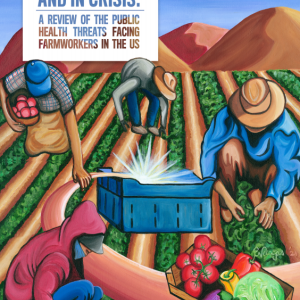
This report from the Johns Hopkins Center for a Livable Future reviews the literature on the working conditions, social contexts and public health threats experienced by farmworkers and their communities in the US.
According to the report, most crop workers in the US are from Mexico (69%), Puerto Rico (24%) or Central America (6%). 49% are not authorised to work in the US, 29% are US citizens and 21% are lawful permanent residents. 29% speak English well.
The health risks identified by the report include:
- Long work hours without the ability to take breaks as needed.
- Inadequate bathroom facilities, resulting in farmworkers limiting their water intake.
- Farmworkers paid by the piece were found to have a 4.5 times higher risk of developing acute kidney illness than those paid in other ways.
- Heat-related illnesses as a result of working under the sun and in high temperatures without adequate rest, water or shade.
- Exposure to pesticides, linked to a range of adverse health outcomes.
- Injuries caused by repetitive motion, made worse by the pressure to work quickly.
- Exposure to animal wastes and the antibiotic-resistant microorganisms they can harbour.
- Injuries from working with machines or animals.
- Gender-based violence, with many female farmworkers being verbally or sexually harassed by their male coworkers.
- Food insecurity, influenced by low wages, lack of access to food retailers and lack of appropriate equipment for storing and preparing food.
- Inadequate protections against COVID-19 exposure at work, particularly in crowded conditions in meatpacking plants.
For each risk identified, the report sets out potential interventions and opportunities for improving the situation.
Read the full report, Essential and in Crisis: A Review of the Public Health Threats Facing Farmworkers in the US, here. See also the TABLE explainer How are food systems, diets, and health connected?












Post a new comment »